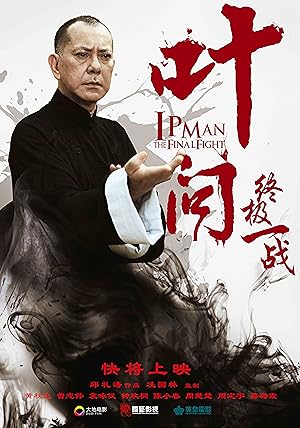After I saw Rogue One: A Star Wars Story and loved it, many people asked me if I saw Ip Man. I hadn’t even heard of it, which shocked people, but hey, I’m only one person. I put any movie with Ip Man in the title in my queue and still knew nothing about the movies. When Ip Man: The Final Fight was about to expire on Netflix, I was unaware that it had nothing to do with Donnie Yuen’s then trilogy, now quadrilogy (another Ip Man film will be released in 2019), I decided to finally buckle down and watch all the movies in one sitting naturally starting with Yuen’s Ip franchise and ending with Ip Man: The Final Fight. I actually debated about watching Ip Man: The Final Fight since it was a mistake, not a thoughtful choice, but decided to push through anyway and watch the film even though it was the last film of the day, and the tired stick was hanging over me.
Comparing Yuen’s trilogy with Ip Man: The Final Fight is instinctual. The most disconcerting part of this viewing experience is how similar the sets are even though different people made these movies at different times. Often without listening to the dialogue, I knew exactly what period was being depicted, which is how I know that Ip Man: The Final Fight is the more detailed film because it is not simply restricted to fighting.
Ip Man: The Final Fight definitely strives to be more realistic and show the titular character’s flaws, ailments, losses and personal conflicts more than the franchise though he is still depicted as a warrior gentleman, a paragon of virtue. It was refreshing to see a more human take on the icon who seems vaguely annoyed when he can’t have a minute to adjust to his surroundings before he has to go to work or when he has to have public printed rap beef with another master, who later becomes a friend. The final farewell between Ip Man and a controversial figure in his life was more poignant than I expected it to be.
Ip Man: The Final Fight is fascinated with visually comparing and contrasting the legend with reality, which is a clever way of having your cake and eating it too. The filmmakers get to use wirework in battle scenes while suggesting that it is absurd. It visually depicts a radio program as if it was a 1950s TV show when the film introduces the villain. I appreciated the ambition of this film that it at least considered the optics of imagination versus reality, but the actual fights depicted in the film were probably unrealistic too so I think that while it was an ambitious distinction, it needed a little more thought in terms of execution and consistency. The press also comes off more like tabloids and less like patriots in their promulgation of the legend.
Ip Man: The Final Fight’s most notable feature is the prevalent role of women in supporting roles. Other than Ip Man, there are not usually that many women characters, especially as disciples, which is odd if you consider that women created the Wing Chun martial arts style. There are two prominent female disciples in this movie: Le, a firebrand union worker, and Chan. The pupils get abbreviated moments in the spotlight yet still manage to provide a broader perspective of the life of a normal person in Hong Kong during the 1950s and 1960s, which can get lost if you’re just following a legend. There is a conflict even among the pupils regarding what is appropriate conduct in the face of corruption and brutality. Also it does more than Yuen’s movies to explain how his pupils became teachers and tried to make a name for themselves in less dramatic ways than Ip Man 3.
In the end, Ip Man: The Final Fight gives us what we expect: Ip Man as a vigilante bringing criminals to justice with the tacit permission of the law. There is a huge conflict during a typhoon, which provides a dramatic showdown with clear lines and none of the greater symbolism provided in Yuen’s films. It is satisfying and wonderfully executed, but perhaps again inconsistent with the film’s criticism of legends falling prey to the hyperbole of imagination.
I don’t think that the framing of the narrative as a story told by his son and the pupils ultimately worked because the story depicts scenes that none of those narrators could know. The narration should have been completely abandoned; the scenes depicted should have been restricted to the narrator’s experience; or an explanation should have been provided regarding how the narrator found out about that moment. It is almost forgivable when we get a few moments of real footage of the master exercising at home.
While I enjoyed Ip Man: The Final Fight, at times, I did find it harder to remain focused because it was the fourth movie of the day, and it was closer to my bedtime. Complexity in a foreign film with subtitles is not always rewarded with attentiveness, which I think is a failing on my part, not the movies. If the movie has a flaw, it is too abbreviated, and it left me wanting to know more about the people in Ip Man’s life other than Bruce Lee. I think that Ip Man has been adequately covered over the years, and it may be time to check out his disciples.
Stay In The Know
Join my mailing list to get updates about recent reviews, upcoming speaking engagements, and film news.




